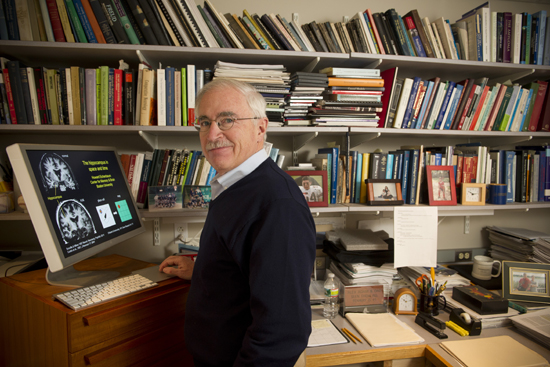BU Scholars Speak at Major Science Convention
AAAS talks include dementia, evolution

Howard Eichenbaum is one of seven BU researchers participating in the American Association for the Advancement of Science annual meeting. Photo by Vernon Doucette
Memory-shredding diseases like Alzheimer’s are tragically commonplace in American families, but brain research at BU and elsewhere is yielding the kind of knowledge that could lead to cures. As an estimated 8,000 scientists and academics flooded into Boston yesterday for the 179th annual meeting of the American Association for the Advancement of Science (AAAS), BU’s Howard Eichenbaum was preparing to share some of the findings that his research has revealed.
“I hope to convey that we are making substantial progress in understanding how the hippocampus, a key brain area that supports memory, organizes representations of memory,” says Eichenbaum, a College of Arts & Sciences professor of psychology and director of the University’s Center for Memory and Brain. “We hope that a greater understanding about how memory is normally organized will provide a further understanding about how memory deteriorates in aging and brain disorders.”
Eichenbaum is among seven University participants at the meeting at the Hynes Convention Center this week. The venerable gathering, billed by the AAAS as the largest such conference in the world, will be devoted to The Beauty and the Benefits of Science, highlighting both basic and applied research—an au courant concern as Congress debates whether to deflect budget cuts in research and other spending slated to take effect March 1. (BU is working to halt the cuts through its membership in the Association of American Universities, a nonprofit organization focusing on issues important to research-intensive universities.)
Meeting sessions will roam far and wide over the scientific landscape: recent finds of Chinese dinosaur fossils, possible links between climate change and meteorological mayhem like Hurricane Sandy, the “scars,” or downsides, of how humans have evolved, and the aforementioned brain research, among other topics. The meeting, which runs from February 14 to 18, includes two Family Science Days, which are free and open to the public and pitched particularly to students in grades 6 to 12.
In addition to Eichenbaum, BU participants listed by the AAAS are Matt Cartmill, a CAS professor of anthropology; Jeremy DeSilva, a CAS assistant professor of anthropology; Douglas Zook, a School of Education associate professor; Janot Mendler de Suarez, a visiting research fellow at the Frederick S. Pardee Center for the Study of the Longer-Range Future; Afaf Hourani, Goldman School of Dental Medicine assistant director of predoctoral research; and Layeeq Ahmed (SDM’13).
Cartmill will be formally commenting on speakers’ insights at the evolution panel, which he considers an important forum for discussing evolution’s misfires. “I plan to note that many other branch points along the human lineage have some piece of associated, unintelligent design: there are scars of vertebrate evolution, scars of mammal evolution, and so on.”
The AAAS, founded in 1848, publishes several journals, including its flagship Science. Boston last hosted the organization’s annual meeting in 2008. Organizers say attendance could top 7,000.
Comments & Discussion
Boston University moderates comments to facilitate an informed, substantive, civil conversation. Abusive, profane, self-promotional, misleading, incoherent or off-topic comments will be rejected. Moderators are staffed during regular business hours (EST) and can only accept comments written in English. Statistics or facts must include a citation or a link to the citation.